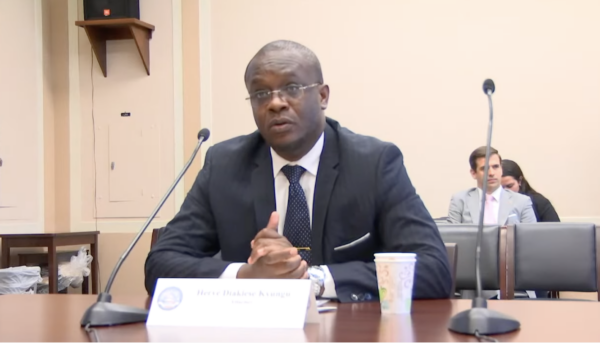Human rights advocates have accused China of exploiting thousands of Congolese children to work in cobalt mines.
There’s a new demand for cobalt, a mineral used in electric car batteries, amid a global race to rule the electric vehicle market. Witnesses testified, however, to the inhumane treatment and abuse of 40,000 children in cobalt mines in the Democratic Republic of Congo at a congressional hearing on July 14.

Congolese advocates said many children are trafficked to work in the mines, chosen because of their size. They are forced to work grueling hours and face injury and disease. The agenda for the commission meeting was driven by a photo of a Congolese boy who lost his leg in an artisanal mine.
“On the backs of trafficked workers and child laborers, China exploits the vast cobalt resources of the DRC to fuel its economy and global agenda,” said New Jersey Republican Rep. Christopher Smith, who chaired the meeting.
“The Chinese Communist Party’s quest for cobalt for batteries and lithium for solar panels to power the so-called Green Economy motivates human rapacity as an estimated 40,000 children in Congo toil in non-regulated artisanal mines under hazardous conditions.”
According to reports, the Democratic Republic of Congo produces more than 70 percent of the world’s cobalt, 15 percent to 30 percent of which is produced in smaller unregulated mines. Cobalt is also used in cellphone and computer batteries. The World Economic Forum’s Global Battery Alliance estimates the demand for cobalt for batteries will grow fourfold in 2030 because of the projected electric vehicle boom.
“The DRC is a resource-rich and governance-poor country,” Smith said.
The small mines, known as artisanal mines, have been notorious for human rights violations, according to reports.The Council on Foreign Relations says the Democratic Republic of Congo is more prone to human rights risks because of “violent ethnic conflict, Ebola, and high levels of corruption.”
Congolese civil rights attorney Hervé Diakiese Kyungu said the artisanal mines “are often no more than narrow shafts dug into the ground, which is why children are recruited.” In many cases, they are forced to do the work using only their hands or rudimentary tools without any protective equipment, he said.
Kyungu said the children are exposed to radioactive minerals and “deadly and painful” diseases because of the mines. The mines are supposed to be owned by Congolese citizens, but they are selling the products mostly to Chinese businesses.
According to a report in the Globe and Mail, as of 2019, China imported 83 percent of its cobalt from the Democratic Republic of Congo, and Chinese companies reportedly control most cobalt mining projects and output.
Pakistanis and Indians are also involved in the trade.
“They are unremunerated and exploited and the work is often fatal as the children are required to crawl into small holes dug into the earth,” Kyungu said.
Kyungu also said Chinese nationals physically oversee some of the mines, referencing a viral video showing a China national ordering mine workers be whipped.
Congolese Catholic priest Father Rigobert Minani Bihuzo told the congressional members the children work “seven days a week and more than 12 hours a day using tools like hammers, chisels, and spades.”
“Their working conditions are like that of slavery,” he said. “Injuries are common, and for those who are hurt or become sick, the lack of medical care means the majority will die due to various untreated illnesses.”
The advocates asked U.S. lawmakers to implement sanctions and bans on investment in cobalt from artisanal mines.
“It comes even here to the U.S., so it means that even your industry are using cobalt that come from mines where children are used, exploited like slaves,” Kyungu said. “Even with respect for your own laws…You are the lawmakers. You need to reinforce it, and people must be prosecuted.”


